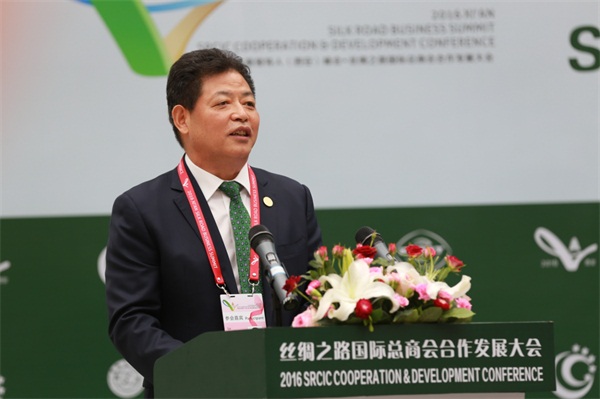 |
|
Lu Jianzhong, Chairman of Silk Road Chamber of International Commerce addresses the SRCIC conference in Xi'an, North China's Shaanxi province. [Photo provided to chinadaily.com.cn] |
In opening the G20 summit, President Xi Jinping counseled world leaders to "avoid empty talk" that usually accompanies such conclaves. Two excellent conferences 10,000 kilometers apart in which I recently participated prove the point that the One Belt and One Road (OBOR) initiative, which has been called "the most significant and far-reaching initiative that China has ever put forward", is exactly thus and that China's actions speak louder than words.
The University of San Francisco's (USF) China Business Studies Initiative (CBSI) forum "One Belt, One Road, One World: New Dimensions of US-China Investment Relations" on September 1 drew intense interest from San Francisco Bay business leaders and others from as far away as Silicon Valley. They wanted to know what OBOR means for US-China investment and trade relations, specifically what new business opportunities OBOR opens for them.
Deputy Chinese Consul-General Ren Faqiang stressed that OBOR is open to all countries. He said that since many US companies are famous for their international experience, global resources and cutting edge technologies, they are well positioned to bid for OBOR projects and cooperate with other companies. Professor Yang Xiaohua, director of CBSI, said that OBOR could even improve bilateral relations if US businesses participate in OBOR, which would positively influence US government policies towards China. CBSI is planning a 2017 follow-up conference in Beijing.
USF's interest in China is hardly opportunistic. University President Paul Fitzgerald spoke about how USF admitted Chinese students a century ago when virulent anti-Chinese sentiments were still codified into law. USF's diverse student population includes 10% Chinese. USF houses the Matteo Ricci Institute, a global resource for studying Sino-Western cultural exchange, which is named after the Italian missionary who lived in China from 1583.
The Silk Road Chamber of International Commerce (SRCIC) Development Cooperation Conference took place in Xi'an a week later and 500 participants from 52 countries attended, including government officials, diplomats, experts and 49 national chambers of commerce heads. The SRCIC is the brainchild of visionary business leader and philanthropist, Lu Jianzhong, who chairs the organization.
The confab resulted in the Xi'an Declaration affirming that SRCIC would facilitate partnerships between governments, national chambers and federations of commerce and businesses to promote win-win OBOR participation. Agreements were signed establishing framework institutions such as the state-of-the-art e-Silk Road platform, Silk Road International Development Fund and Silk Road International Commodity Exchange.
According to Chairman Lu, seven projects launched on the e-Silk Road platform will "promote business opportunities and stimulate pragmatic cooperation by matching up interconnected projects and investments, integrating resources as well as providing services for members of the SRCIC and other countries to facilitate business investment and cultural exchange."
Summarizing the hope and spirit of both conferences and of OBOR itself, Professor Jean-Pierre Lehmann concluded that "having in many ways missed and mangled the great opportunities that presented themselves with the transformations of the early 21st century, and fallen into a despondent rut, we must ensure that new opportunities arising from OBOR are seized with entrepreneurial verve and the dreams materialize into financially, socially, environmentally, and culturally gainful opportunities."
I couldn't agree more! Instead of promoting empty talk, these two conferences, half a world apart, each provided participants with the knowledge, tools and motivation to profit from President Xi's farsighted initiative and benefit all stakeholders.
The author is a senior adviser to Tsinghua University and former director and vice-president of ABC Television in New York.
The opinions expressed here are those of the writer and don't represent views of China Daily website.